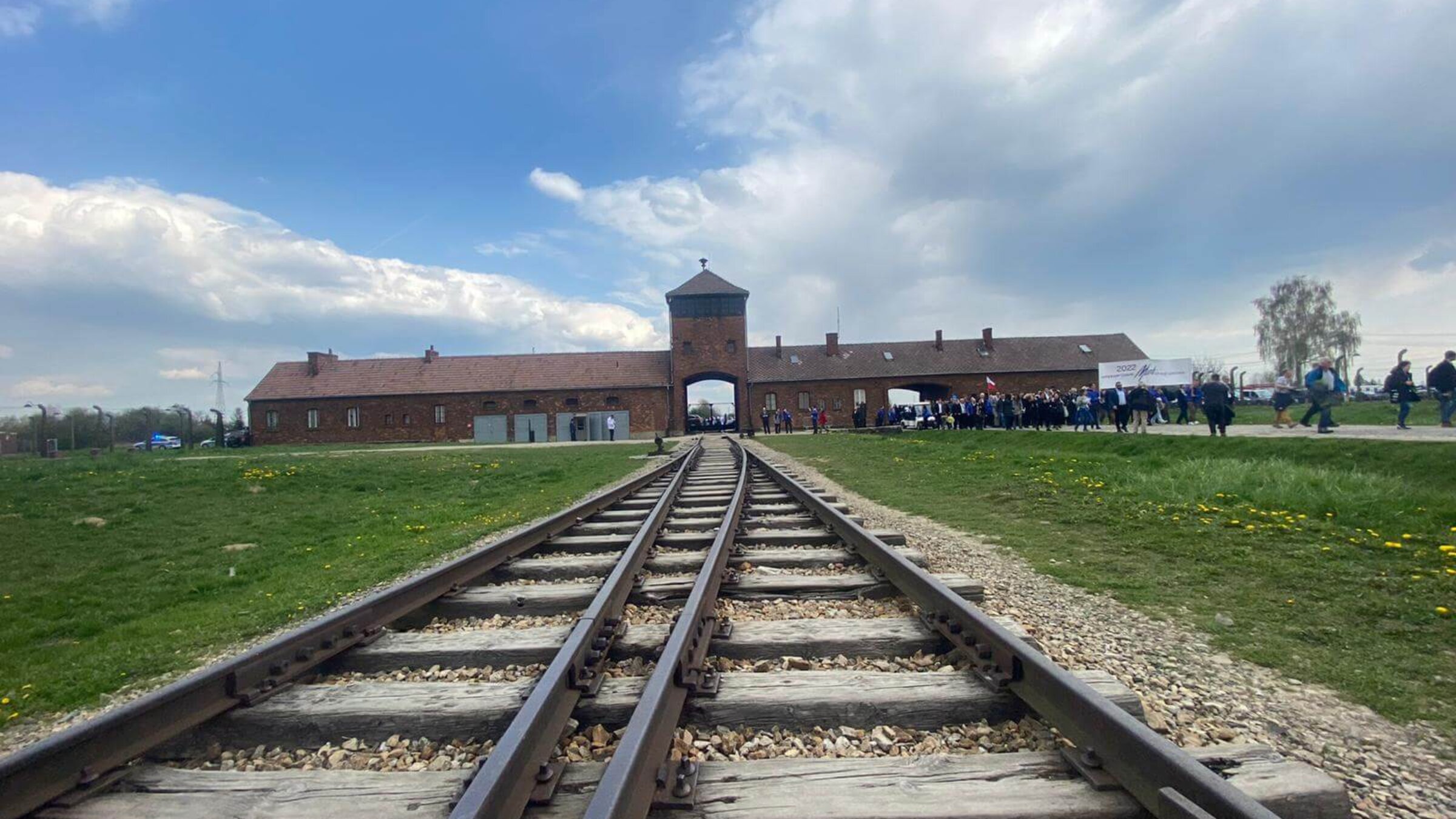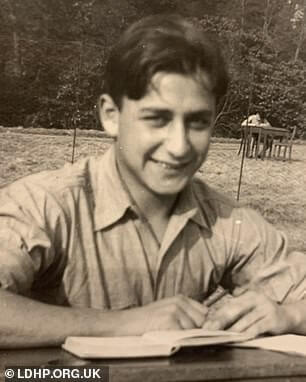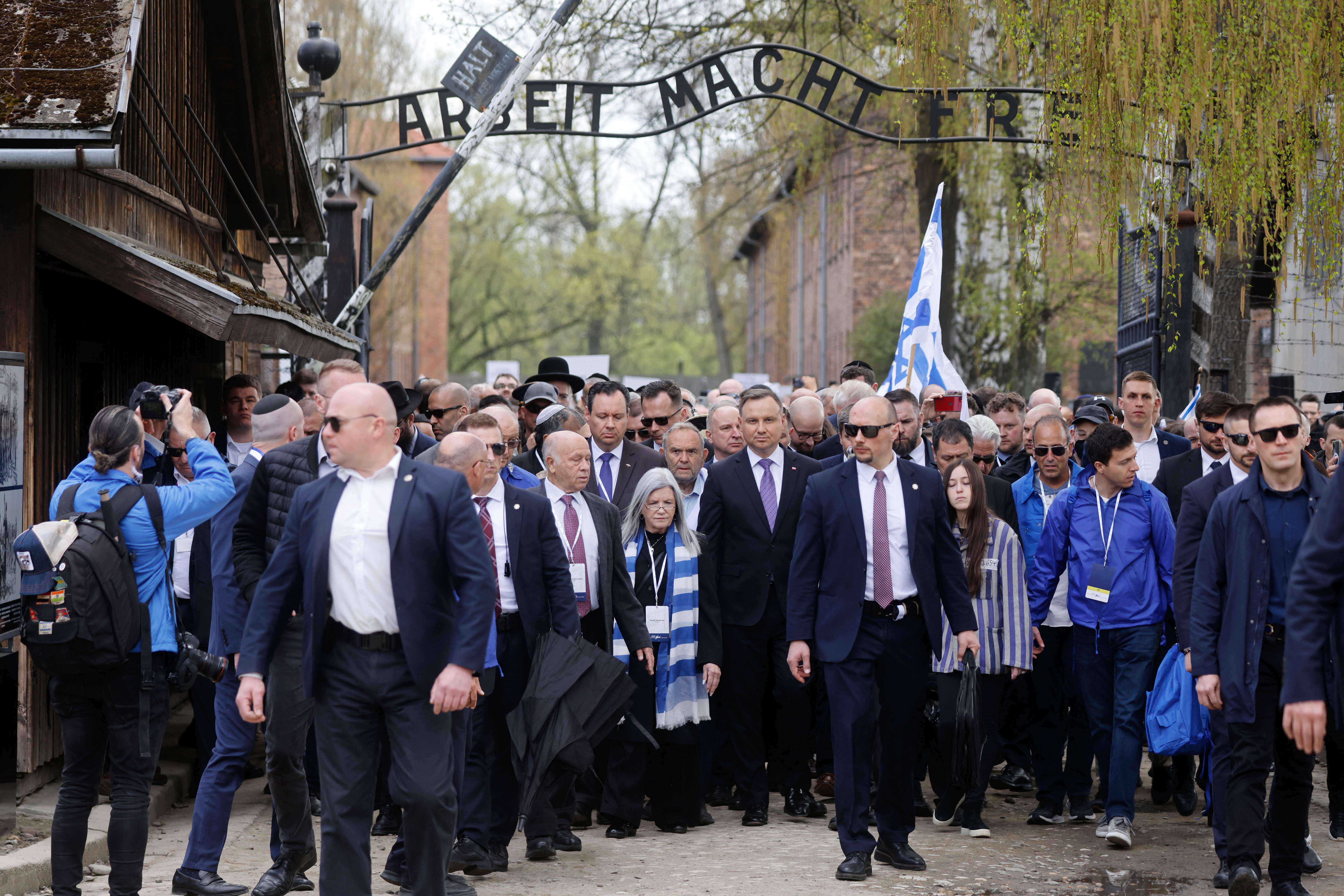‘I’m not scared of anything anymore’: what it’s like leaving Auschwitz with a Holocaust survivor
‘I have nightmares from the memories,’ Harry Olmer told me as we walked to Birkenau. ‘But I’m not scared of anything anymore.’

The train tracks leading from Auschwitz, the Holocaust concentration camp Photo by Nora Berman
OŚWIĘCIM, POLAND — “Where are all the Americans?” Harry Olmer asked me.
Olmer, 94, moved his sensible blue walking shoes with a purposeful stride. He did not sit down or stop for a sip of water during the entire two-mile walk from Auschwitz to Birkenau.
We had already passed the seven other Holocaust survivors and the student delegations of Germany, Belarus, Poland and Ukraine that were ostensibly leading the March of the Living, an annual march of thousands on Israel’s Holocaust Remembrance Day.
Olmer’s official companion was anxiously trying to get him to slow down before he passed the police escort.
“I think their parents were scared because of the war in Ukraine,” I told him.
Olmer shot me a withering look, clearly unimpressed by the anxieties of American parents. I couldn’t blame him.
Olmer is slightly stooped, but aside from a hearing aid, he moves with the strength of a man 20 years his junior. His blue eyes meet your gaze directly when he talks — he confessed to me that he struggled to “walk and talk,” preferring to stop, square his shoulders, and answer my questions directly. He marched like he was on a mission, resisting any offers of a chair, water or brief rest.

Harry Olmer, was born on Nov. 15, 1927, with the name Chaim, in the industrial city of Sosnowiec in southwest Poland. He and his parents, four sisters and his brother lived in relative happiness until 1939, when Hitler invaded Poland.
Olmer was just 12 years old. I asked him about his happiest memory before the war, and he told me simply, “My family. They were the most important thing to me.”
I did not yet know that Olmer, his brother and his sister were the only members of their family to survive the Holocaust. As we continued to walk together, I carried his coat and he told me more about his life.
Soon after the Nazis occupied Poland, fearing violence, the Olmers moved an hour’s drive east to live with his grandmother at the home of a generous farmer. They were forced to do hard labor, breaking up stones in order to fill potholes, replanting trees in the forest and making repairs to German homes. “It was hard, but we lived together at home,” Olmer said.
In 1942, the Jews of Miechow Charsznica were expelled from their homes. Olmer was beaten with a lead-tipped whip, separated from his mother, grandmother, and sisters, and sent to Plasnow, the first in a series of concentration camps he was imprisoned in, where he was forced to work in a brick factory, digging clay and pushing it in heavy carts back to the factory. In the summer, it was so hot that they could barely touch the floor, and certainly couldn’t sleep. None of his relatives knew where he had been sent.
He was then sent to Skarżysko-Kamienna, where he was forced to work in a munitions factory. When he said the name of the town, he gripped my wrist: “it was hell, truly hell on earth.”
It was truly dangerous work, filling munitions with acid in a chemical factory, and the S.S. frequently killed weakened prisoners. Many mornings, Olmer would wake up next to a corpse. The average man sent to this factory survived for only six weeks.
In 1944, he was sent to Buchenwald and then Schlieben. In 1945, with the Soviets approaching, the Nazis sent him to Theresienstadt, an S.S. transit camp in Nazi-occupied Czechoslovakia. Olmer, along with nearly 30,000 others, was liberated by the Red Army on May 8, 1945, 300 miles away from where he’d been at the start of the war. He was 17 years old.
From there, he went to England, and he still lives in London, alone. He married his wife Margaret, a Kindertransport refugee from Vienna, in 1954. They had four children and eight grandchildren; she now lives in a nursing home.
Olmer’s official March companion, Joanna Skala Ison, later whispered the brutal circumstances of his liberation: “He was nearly dead of typhus. The rest of the camp had been sent on a death march and he was left behind. The Soviet Army found him alone, weighing about 80 pounds.”
Olmer was one of the Windermere Children, a group of about 300 orphaned boys and a few girls who were permitted to come to the Lake District in England. Despite knowing no English when he arrived, after he recuperated, he went to Scotland, where he served in the British Army and trained to become a dentist. Seven years after arriving in the U.K., he was reunited with the sister he thought was dead.
Olmer had a dental practice in England until he retired at the age of 86. (As of 2021, he was officially the UK’s longest-serving dentist.)
It was hard to reconcile the image of an emaciated 17-year-old with the strikingly energetic 94-year old man I was walking with today. He hated to slow down, and when Skala Ison worried that they had lost the rest of their British delegation and the rest of the survivors, he reassured her, “we do this part alone.”
While he was far from physically alone — our little foursome of Chaim, Skala Ison, stuck together from the famous entrance gates of Auschwitz proclaiming “Arbeit Macht Frei” to Birkenau – I couldn’t stop marveling at how much sheer chutzpah he had and how physically fit he was despite his age.
While Olmer had never been a prisoner at Auschwitz, I asked him at one point if he was scared of walking among barbed wire and crematoriums, the sites where 4,000 Jews were gassed daily.
“I’m not afraid of anything!” he said chuckling, “with all these people here!”
He gestured to the crowd of people surrounding us, including Polish President Andrzej Duda’s imposing security detail.

“Of course,” I said laughing. “I meant more, doesn’t it bring back bad memories?”
“Memories, memories — I have nightmares from the memories. But I’m not scared of anything anymore.”
I knew as I walked with Olmer that every moment was incalculably valuable. I felt held by his presence as we walked through the suburbs of Oswiecim to the extermination camp of Birkenau. His face lit up each time I returned after running off to take photos.
If this man who was orphaned by the Nazis felt no fear, how could I ever feel afraid of anything?
Though we walked through an area where millions of Jews had been murdered, with Olmer, I had a palpable sense of joy.
When the official ceremony concluded, I tapped Olmer on the shoulder — he beamed at me like I was his grandchild. We hugged and snapped a few brief photos before he was quickly ushered away. I half expected him to continue walking west, across the river where the ashes of Jewish men, women and children were heartlessly dumped, and into the sunset.
In a way, Harry Olmer has never stopped walking. I am grateful that, for a few brief moments in his extraordinary life, we walked together.
A message from our Publisher & CEO Rachel Fishman Feddersen

I hope you appreciated this article. Before you go, I’d like to ask you to please support the Forward’s award-winning, nonprofit journalism so that we can be prepared for whatever news 2025 brings.
At a time when other newsrooms are closing or cutting back, the Forward has removed its paywall and invested additional resources to report on the ground from Israel and around the U.S. on the impact of the war, rising antisemitism and polarized discourse.
Readers like you make it all possible. Support our work by becoming a Forward Member and connect with our journalism and your community.
— Rachel Fishman Feddersen, Publisher and CEO





























